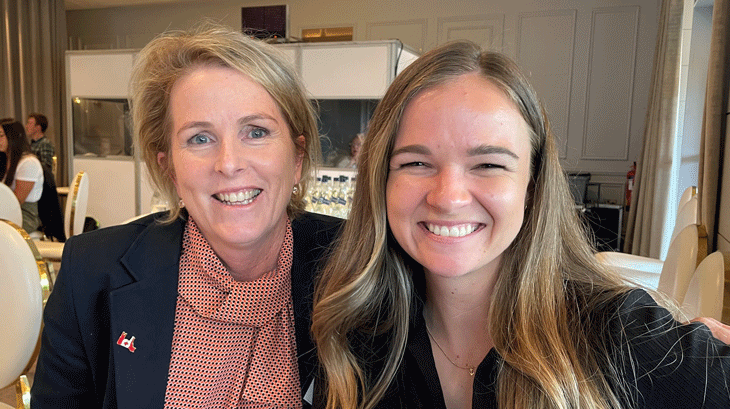Kari Moffatt from the ABSF Sustainability Steering Group on her take-home messages from GASL

Caption: Kari Moffat (right) and Melinee Leather were part of a delegation of Australian representatives to attend the Global Agenda for Sustainable Livestock (GASL) in Dublin last month.
On 7 October the 12th Multi-Stakeholder Partnership Meeting of the Global Agenda for Sustainable Livestock (GASL) wrapped up a week of valuable knowledge exchange and lively discussions about the actions of the livestock sector towards more sustainable food systems.
Almost 150 participants gathered in Dublin, including representatives of the Australian Beef Sustainability Framework’s Sustainability Steering Group (SSG).
We caught up with SSG member, Kari Moffat, on the key messages she took home from the event.
What did you find the most interesting or surprising learning to come from the event?
As a net exporter, Australia’s livestock industries play a vital role in supplying high quality protein into countries that cannot meet their own domestic consumption requirements. What this conference highlighted was that two billion people globally are ‘hidden hungry’, a term I wasn’t familiar with. ‘Hidden hungry’ refers to people who consume their daily calorie intake but are deficient in essential vitamins and minerals. There is a correlation between countries with low animal protein intake and figures on child stunting, which highlights the need for animal protein in meeting global nutritional security.
This sparked discussion on the complex challenge of implementing environmental policies and meeting global nutritional requirements. Developed nations, particularly those that produce high quantities of exported animal proteins, have a significant role to play in meeting food requirements for developing nations. But environmental policies such as those in Ireland and New Zealand will see a possible reduction in beef and dairy production in the long term. So how do we find the balance between meeting global food requirements and policies that ensure environmental sustainability?
What did you learn that could be relevant for the Australian beef industry?
Ireland has a national assurance program called Origin Green, which demonstrates the sustainable credentials of its dairy, beef, and lamb products. At farm level, there are more than 55,000 members of Bord Bia’s Sustainable Assurance Schemes for beef and lamb producers (92% of beef produced), dairy farmers (95% of milk produced), horticulture (70% of horticulture) and egg producers (95% of eggs), which are aligned to Origin Green. Sustainability assurance schemes are also being developed for poultry and pigs.
650 third-party audits are carried out each week with all producers under the scheme audited on-farm annually. The program has also conducted more than 300,000 carbon accounts over 100,000 farms. The program criteria measured and monitored include greenhouse gas emissions, biodiversity, water use, energy efficiency, soil management and socio-economic factors, and individual feedback is provided to each farmer about areas for improvement.
It's an impressive scheme providing third-party-assured sustainability credentials, which may be something Australia could look at.
How does what we’re doing on the ground in Australia compare to what is happening in other nations?
Australia’s target for carbon neutrality by 2030 is more aggressive than some other countries who have reduction targets, rather than neutral targets, by 2030. Some countries are aiming for neutrality by 2050.
Why was it important to attend the event?
Attendance at GASL was a valuable check-in, to compare where Australia sits in terms of our sustainability goals with what other countries are doing in this space. It was promising to see a lot of alignment with other countries on similar emissions goals, which will be important to reference in terms of R&D and possible opportunities to collaborate in the future on common goals.
On the flip side, the meeting brought to our attention Australia’s privileged position in terms of our abundance of high-quality food and other opportunities such as equality, education and access to resources. Front and centre was the fact that we live in a global community and the decisions we make as an industry and nation have a flow-on effect to countries in less privileged positions. We have a role as global citizens and industry leaders to ensure we keep this in mind when making policy decisions.
What were people from other countries saying?
There was a distinct gap between the conversations of those from developed and developing nations, given priorities differ so greatly. Developing nations are focused on emissions reduction and ensuring they move to more environmentally friendly practices. Whereas developing nations are focused on meeting food and nutritional security. Every conversation stressed the need to maintain the economic viability of livestock production.
Where are our greatest opportunities to take action to achieve more sustainable food systems?
It is vital to have open conversations at both a national and global level to ensure policy isn’t created in silos. The importance of science-based evidence and data is key to lobbying government on environmental policy in the future, including the important role that livestock plays in meeting global nutritional security and sustainable food systems.
There was also a good reminder about the importance of placing equal weighting on sustainability pillars (environment, social, economic), not just environment, which becomes the key focus a lot of the time.
More information
Contact:
Resources: